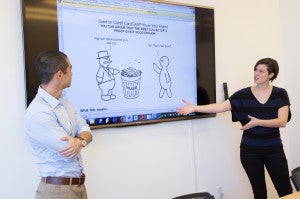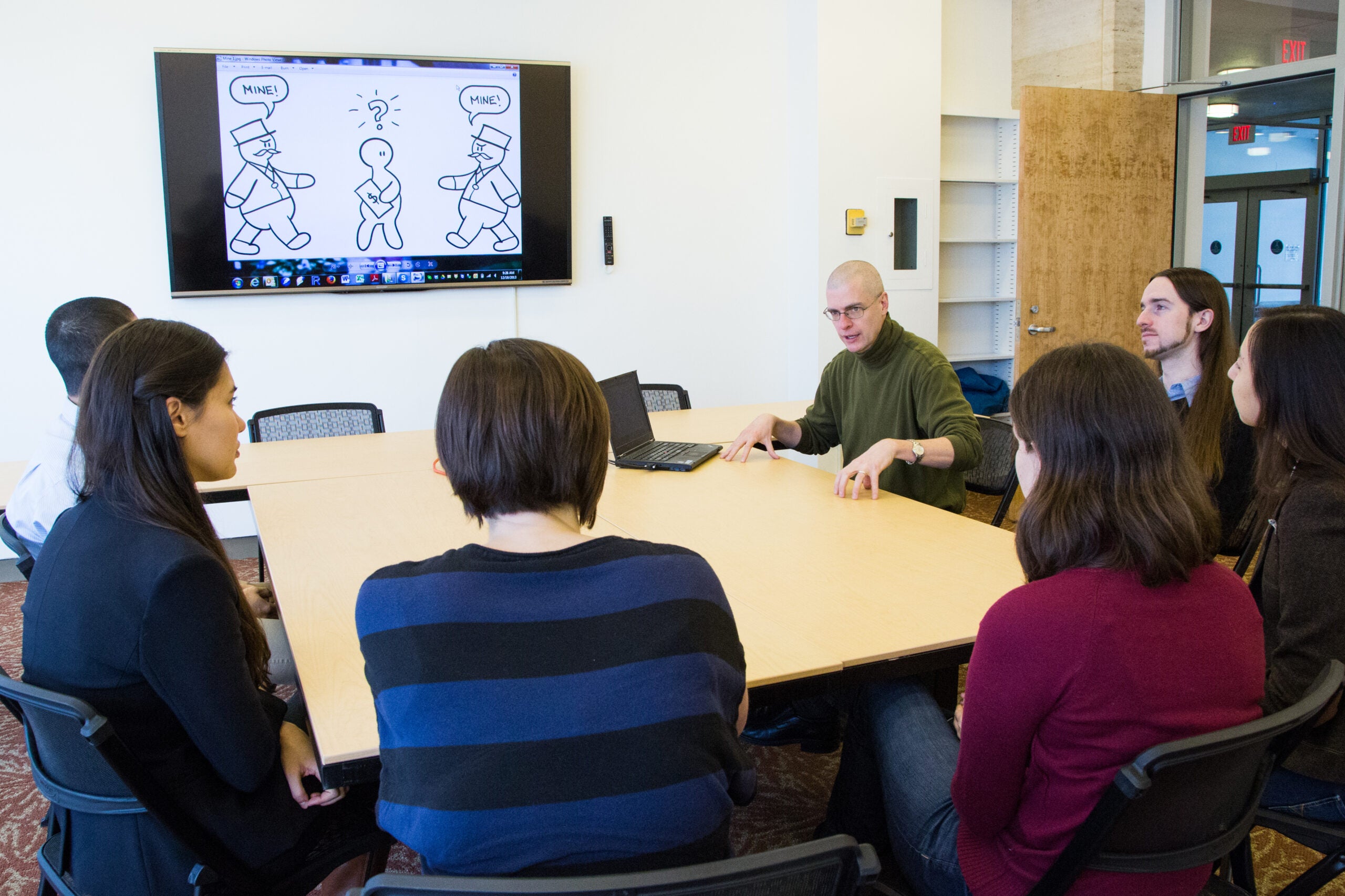Almost one-third of Americans have no savings at all while half lack a financial cushion to survive three months without income. Half pay sub-prime rates for credit, and 30 million have at least one delinquent item on their credit reports listed as “in collection.”
This widespread state of severe financial distress, made far worse by the Great Recession, “is a cancer affecting U.S. society,” says HLS Professor Jim Greiner, and often leads to a host of other legal problems including divorces, evictions, and increased claims for government benefits. Clearly, it is to the nation’s benefit to improve the financial health of its citizens, he adds.
But what is the best way to assist the millions of people with legal issues stemming from serious financial and credit problems? While lawyers have an important role to play, providers of pro bono legal services haven’t devoted much attention to helping clients sort out their financial obligations. In any event, there will never be enough lawyers to assist everyone who needs help repairing credit, negotiating with debtors, litigating debt collection, and, when necessary, filing for and litigating bankruptcy, Greiner notes.
How best to assist people in financial trouble is the focus of a groundbreaking new study, the Consumer Financial Distress Project, designed and led by Greiner, Professor Dalié Jiménez at the University of Connecticut School of Law, and Professor Lois Lupica at the University of Maine School of Law. With students at these three law schools, the Project is a unique partnership with the Maine judiciary, a legal services organization in Maine, a major financial counseling company, and a national credit-reporting agency.
The project, the largest randomized study ever conducted in the law, is expected to last five or six years, and is designed to find out how and when legal aid is most effective, a kind of triage framework to best deploy limited legal services. About 20 HLS students, all volunteers, have worked on the project so far, including creating a new type of self-help legal guide to assist clients with financial problems. The HLS Program on the Legal Profession (PLP), where Greiner, Jiménez and Lupica are affiliated faculty members, supports this research project and others like it. PLP’s central mission is to conduct groundbreaking, empirical research on the rapidly changing structures, norms and dynamics of the global legal profession, of which questions of access to justice and the availability of legal counsel are central.”
“The question is, assuming there will never be enough civil legal attorneys for people who need them, how can those attorneys be used most effectively to impact the largest number of people in the biggest possible way,” asks Andrea Matthews ’15, who was particularly eager to join Greiner’s work because she came to HLS with a background in applying scientific methodology to the field of criminal justice. “Maybe some can represent themselves with some help and don’t need full legal representation. Or maybe they can represent themselves completely on their own if they have the right materials created by lawyers.”
Comparing the long-term outcomes of different levels of legal intervention will yield invaluable data that could have a significant impact on access to justice issues, Greiner hopes.
“I would like the study to result in solid information about whether legal interventions and financial counseling really make a difference over the medium- to long-term,” says Greiner, who holds a Ph.D. in statistics from Harvard and has conducted other studies on access-to-justice issues. “We’re hoping the project will tell us, do you need a lawyer at the negotiation stage? Or when it’s time to talk to the judge, because most pro se clients freeze? Or do they most need legal help once they try to repair their credit reports? We want to know where it is most people are likely to fall down—so that’s where you put the lawyer.”
The project was in the planning stages for about a year and a half; this past semester, students began creating the self-help guides by drawing from studies in the medical and other fields on how to convey complex information to people unfamiliar with it. A pilot program will begin this summer in Maine. Eventually, the project will divide hundreds of low-income clients with financial problems into four groups that will receive different types and levels of legal aid and financial counseling. Greiner and his students will then analyze the data and compare outcomes by measuring their credit scores and credit reports several years later, to learn which approaches were most effective.
As a randomized control trial, or RCT, this approach is the gold standard for a clinical trial, similar to the type of highly rigorous trials used to test new pharmaceuticals or medical devices, but is still quite rare in the law, Greiner notes. His study has received some seed financing but he is currently fundraising to attract more donors. Since the students are volunteering, and Greiner is on the HLS faculty, 100 percent of the funds raised will go to providing the services and gathering the information to assess whether those services work.
So far, the HLS students have donated more than 2,500 hours of their time on such tasks as researching the civil law in Maine and combing through research on how best to present complex instructions. They are receiving no academic credit. “The best part of my whole job right now is working with this volunteer group because they’re getting no credit, no recognition. They’re simply doing it because they believe in it and think they can learn from it,” says Greiner. “It’s inspiring.”
The students assisting him say his expertise in the area, and his enthusiasm for the work, draw them to volunteer their time. “Professor Greiner is a leader and a pioneer in applying statistical methodology and randomized control trials to the law and to looking at effective representation by lawyers,” says Harin Song ’14. “That’s exciting.”

In a particularly fun and creative aspect of the project, students have created very simple self-help tools, complete with cartoon figures, to help pro se clients represent themselves in court, negotiate with debtors, and overcome the feelings of embarrassment and shame that often accompany financial problems. Using a genderless figure the HLS group have named “Blob,” one set of cartoons explains how the statute of limitations works; another explains that debt-collectors must bring evidence of the debt to court or they can’t prevail. They also tell clients how to argue for themselves before a judge.
“The idea is, the simpler the character, the easier for the person reading it to put themselves in those shoes,” says Hallie Pope ’14, an amateur cartoonist who was recruited for the project this fall. “Blob is genderless, raceless, and hopefully, relatable.”
Song, who has been a team captain since last year, says the project, especially the new self-help guides, aim to empower clients. “The pro se litigant doesn’t have to understand the nitty-gritty details of the business record exception, just the basics,” she says. “The idea is, the plaintiffs have to prove their cases. If we can get the clients to trigger that question—has the case been proved?—the judge can assess the affidavits and other information for legal sufficiency.”
The study will also examine allegations of widespread abuse in the debt-collection industry. Many owners of the original debt, such as credit card companies, sell the debt; the new debt collectors, however, often have no supporting data to show how much is owed, the interest rate, and so on. Debtors often are afraid to go to court, and so the debt buyer may receive default judgments—perhaps for inaccurate amounts—and go on to garnish the debtor’s wages or seize their assets. Greiner’s study wants to examine whether these abuses are happening, and on what scale.
The Maine Judiciary has provisionally agreed to participate in the project, as has Pine Tree Legal Assistance, the primary legal aid provider in Maine. A participation agreement with a major credit reporting agency is expected soon, Greiner says, and the nation’s largest non-profit financial counseling provider is also on board.
John Dey ’14 has been involved with the project since the fall of 2012, putting in several hours a week including meeting weekly with Greiner and other students. “I hope that whatever our findings are, they are helpful to the legal aid community and pro se defendants,” he says. “We hope to help direct limited resources to be used in the best way possible.”
